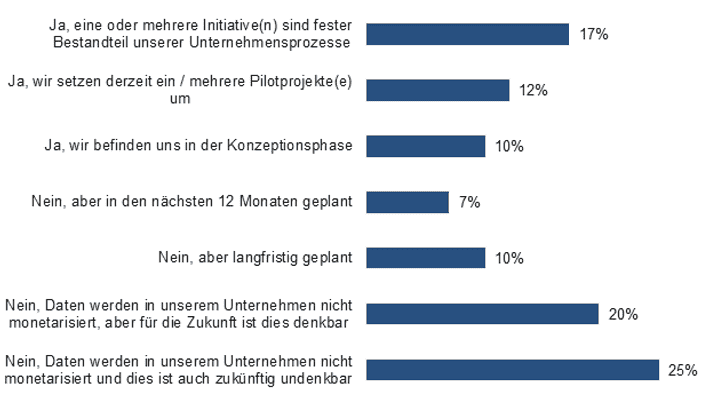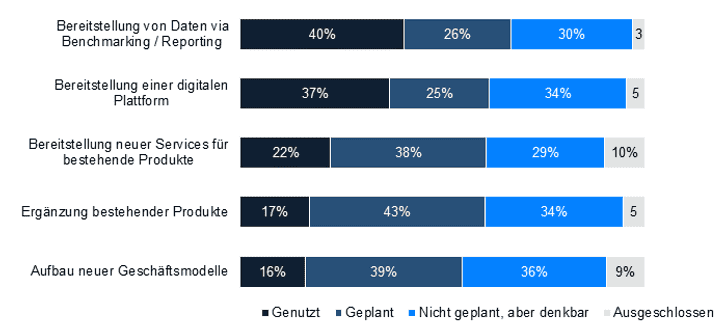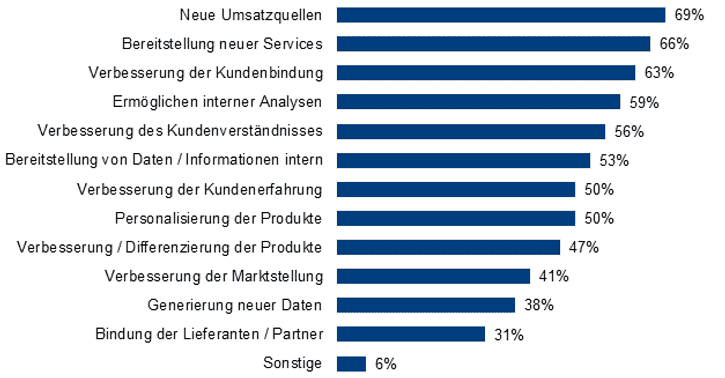BARC Survey Finds Data Monetization Is In The Early Stages of Adoption But Is Expanding
The Business Application Research Center (BARC) publishes “Data Monetization – Use Cases, Implementation and Added Value”, the results of a survey sponsored by Tableau examining current approaches to data monetization in European companies.
17 percent of companies have established data monetization initiatives, a further 12 percent are currently building prototypes and another 10 percent are still developing concepts, according to new research from BARC. Large companies from retail, services, finance and banking are leading the way and, in general, data monetization is principally being implemented by larger companies. 25 percent of large companies and 23 percent of larger medium-sized companies responding to the survey have already launched data monetization products. In contrast, only 9 percent of small and 13 percent of small to medium-sized companies have already done so.

“Companies still have the opportunity to secure a competitive edge by engaging in data monetization”, said Sebastian Derwisch, BARC analyst and author of the report. “Our results show there is value in data monetization, but management needs to give priority to these initiatives. Therefore, data monetization projects must be tied to business goals and strategy.”
Providing results for process improvement is the main way to monetize data
Providing analysis results is the most common form of monetizing data. 40 percent of survey participants employ this type of data monetization, whereby data analytics is involved. The provision of data via reporting and benchmarking is almost as important (37 percent). Less common methods include establishing digital platforms (22 percent), extending existing products (17 percent), providing new services (16 percent) and building new business models based on data (6 percent).
Data monetization occurs mainly via the distribution of analysis results and through reporting and benchmarking. Fewer companies establish digital platforms, enhance existing products with new services or create new business models.
“The main focus is on the internal distribution of results as external data monetization is more complex, requiring companies to rethink business models”, commented Derwisch. “Furthermore, the higher standards of data quality and security required for external data monetization may be seen as a barrier.”

Benefits of data monetization are tangible
Data products can bring a broad range of benefits, from new revenue sources to a better understanding of customers and product improvements. New revenue sources are the most prevalent benefit of data products, reported by 69 percent of respondents. For 66 percent, the provision of new services is a benefit, and improved customer loyalty is cited by 63 percent of participants. Internal provision of the results of data analysis is a motivation for data monetization for more than half of respondents (59 percent), as is the internal provision of data and benchmarks (53 percent). Better insight into customers and improved customer experience – for example by personalization – is achieved by about 50 percent of participating companies. Generating new data is only viewed as a benefit by 38 percent, and binding partners and suppliers by 31 percent.

About ‘Data Monetization – Use Cases, Implementation and Added Value’
‘Data Monetization – Use Cases, Implementation and Added Value’ is a survey-based study offering insights into how European companies are approaching data monetization. The online survey was carried out in October and November 2018, attracting 200 participants from a wide range of company sizes and industries. The full study is available free of charge thanks to sponsorship from Tableau. On completion of a short registration form, it can be downloaded from the Tableau website. BARC and Tableau will be presenting the survey results in a series of webinars in English, German and French on June 4th. For further information, visit: www.tableau.com
